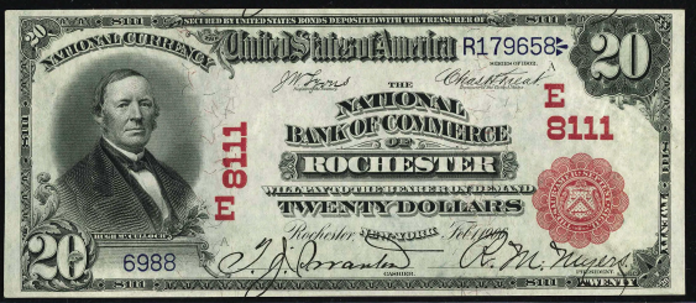Twenty Dollar Notes › Nationals › 1902 Twenty Dollar National Bank Notes › Kentucky Charters › 1902 $20 Grayson Kentucky First National Bank
Get Value Now
| Item | Info |
|---|---|
| Series | 1902 |
| Charter | #12982 First National Bank of Grayson, Kentucky |
| Year Chartered | 1926, 156 Banks Chartered |
| City Info | Grayson is a home rule-class city in and the county seat of Carter County, Kentucky, United States, in the state's northeastern region. The population was 4,217 at the 2010 census. Along with Carter County, the city is closely associated with the nearby Huntington-Ashland, WV-KY-OH Metropolitan Statistical Area being just 9 miles west of the M.S.A's western boundary. The city has grown in size substantially since the opening of Interstate 64 in 1975 through Carter County. Immediately afterwards, Grayson experienced several years of commercial sector growth to serve the Interstate 64 traffic. Since 1990, the city has also seen significant growth in the residential sector with the Interstate making for a faster trip to and from Ashland. Beginning in 1995, AA Highway terminates in Grayson making the city a gateway to the Huntington-Ashland urban area. Source: Wikipedia |
| Similar Cities | City name is unique, no others like it. |
| Seal Varieties | Red, Blue |
| See Also | If your note doesn't match try: 1. 1905 $20 Gold Certificate 2. 1906 $20 Gold Certificate |
| Other Info | 1. Value depends on notes known for charter, condition and market demand. |
| Neat Fact | Some issues contain regional geographic identifiers. N = New England. E = Eastern. M = Midwest. S = Southern. W = Western. P = Pacific. The letters were included for hand sorting purposes (Kelley, 5th Ed. P 5). |
No Obligations Offers and Appraisals
Please submit a good photo or scan. It will be identified and evaluated. Understand there may be subtle differences between the image you see above and your note. Signatures, design, markings and note condition will determine the offer price. Notes in Uncirculated or better condition receive the best offers.
Appraisals can be estimated for wholesale and retail prices. Wholesale is what dealers typically pay. Retail is what a collector might pay. Retail is slightly higher in most cases.
Please visit this page for USA Paper Money Reference. Do not treat this page as a reference guide, it is for appraisal and acquisition purposes only.
